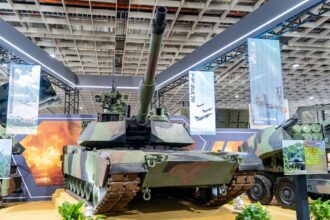The Main Intelligence Directorate, commonly known as GRU, has its roots deeply embedded in the tumultuous history of Russia. Established in 1918, shortly after the Bolshevik Revolution, the agency was created to serve the needs of the Red Army. Its primary purpose was to gather military intelligence and conduct operations that would bolster the fledgling Soviet state.
Over the decades, GRU evolved from a nascent organization into one of the most formidable intelligence agencies in the world, adapting to the changing political landscape and the demands of global warfare. Initially, GRU operated under the auspices of the Soviet military, focusing on traditional espionage activities such as gathering information on enemy troop movements and capabilities. However, as the Cold War intensified, the agency expanded its scope to include counterintelligence and covert operations.
This evolution was marked by a series of high-profile missions that showcased GRU’s capabilities and cemented its reputation as a key player in international espionage. The agency’s history is not just a chronicle of military intelligence; it reflects the broader narrative of Russia’s geopolitical ambitions and its quest for security in an often-hostile world.
Key Takeaways
- The GRU, Russia’s military intelligence agency, has a long and storied history dating back to the early 20th century.
- The agency is organized into various directorates and operates both domestically and internationally to gather intelligence and support Russian interests.
- GRU plays a significant role in Russian foreign policy, conducting covert operations and espionage to advance the country’s global agenda.
- Infamous missions and covert activities, such as the Salisbury poisoning and election interference, have brought GRU under international scrutiny.
- GRU utilizes cyber warfare tactics to conduct espionage and gather intelligence, leveraging technology for its covert operations.
The Structure of GRU: How the Agency is Organized and Operates
The organizational structure of GRU is designed to facilitate its multifaceted operations, which range from intelligence gathering to direct action missions. At the top of this hierarchy is the Chief of GRU, who reports directly to the Minister of Defense. Beneath this leadership are various directorates responsible for different aspects of intelligence work, including operational planning, analysis, and technical support.
This division of labor allows GRU to operate efficiently and respond swiftly to emerging threats. GRU’s operational units are particularly noteworthy. They include special forces known as Spetsnaz, which are tasked with conducting covert operations both domestically and abroad.
The agency also employs a network of agents and informants worldwide, enabling it to gather intelligence from diverse sources. This intricate web of organization and operational capability underscores GRU’s role as a critical instrument of Russian military power.
The Role of GRU in Russian Foreign Policy: How the Agency Supports Russian Interests Globally
GRU plays a pivotal role in shaping Russian foreign policy by providing essential intelligence that informs decision-making at the highest levels of government. The agency’s insights into global political dynamics and military developments allow Russian leaders to craft strategies that align with national interests. By monitoring foreign military capabilities and political movements, GRU helps ensure that Russia remains a formidable player on the world stage.
Moreover, GRU’s covert operations often serve as tools of statecraft, allowing Russia to exert influence without resorting to overt military action. Whether through supporting proxy forces in conflict zones or engaging in disinformation campaigns, GRU’s activities are designed to advance Russian interests while minimizing risks. This strategic use of intelligence underscores the agency’s importance not only in military contexts but also in broader geopolitical maneuvering.
The Notorious Operations of GRU: Infamous Missions and Covert Activities
| Mission | Year | Target | Outcome |
|---|---|---|---|
| Operation Ghost Stories | 2010 | Deep-cover agents in the United States | Agents arrested and exchanged for Russian spies |
| Operation Infektion | 1980s | Disinformation campaign to spread AIDS conspiracy theories | Spread false information to create confusion and distrust |
| Operation Olympic Games | 2006-2010 | Stuxnet cyberattack on Iranian nuclear facilities | Caused significant damage to Iran’s nuclear program |
| Operation Inadmissible | 2018 | Chemical weapon attack in Salisbury, UK | Resulted in international condemnation and diplomatic fallout |
Throughout its history, GRU has been involved in numerous high-profile operations that have garnered international attention and notoriety. One such operation was the assassination of political dissidents and foreign adversaries, which has drawn widespread condemnation from human rights organizations and foreign governments alike. These missions often involve intricate planning and execution, showcasing GRU’s capabilities in covert action.
Another infamous operation attributed to GRU is its involvement in cyber warfare, particularly during the 2016 U.S. presidential election. The agency’s cyber unit executed a sophisticated campaign of hacking and disinformation aimed at undermining public trust in democratic institutions.
This operation not only highlighted GRU’s technological prowess but also raised questions about the ethical implications of state-sponsored cyber activities. Such missions have left an indelible mark on international relations, prompting countries to reassess their own security measures against similar threats.
The Cyber Warfare Tactics of GRU: How the Agency Utilizes Technology for Espionage
In recent years, GRU has increasingly turned to cyber warfare as a means of conducting espionage and influencing global events. The agency has developed a range of sophisticated cyber capabilities that allow it to infiltrate foreign networks, steal sensitive information, and disrupt critical infrastructure. This shift towards digital warfare reflects a broader trend among intelligence agencies worldwide, as technology continues to reshape the landscape of espionage.
GRU’s cyber tactics often involve a combination of traditional espionage techniques and advanced technological tools. For instance, phishing attacks are frequently employed to gain access to secure systems, while malware is used to exfiltrate data or disrupt operations. The agency’s ability to adapt to new technologies has made it a formidable adversary in the realm of cyber warfare, posing significant challenges for nations seeking to defend against such threats.
The Recruitment and Training of GRU Agents: The Process of Building a Covert Network
The recruitment and training process for GRU agents is rigorous and highly selective, reflecting the agency’s need for skilled operatives capable of executing complex missions.
This focus on diverse skill sets ensures that GRU can assemble teams capable of addressing a wide range of operational needs.
Once selected, recruits undergo extensive training that encompasses both physical conditioning and technical skills development. This training often includes instruction in languages, surveillance techniques, and combat tactics. Additionally, psychological assessments are conducted to evaluate candidates’ suitability for covert work, ensuring that only those with the right mindset are entrusted with sensitive missions.
This comprehensive approach to recruitment and training underscores GRU’s commitment to maintaining a highly capable and adaptable workforce.
The Relationship Between GRU and Other Russian Intelligence Agencies: Collaboration and Competition
GRU operates within a complex landscape of Russian intelligence agencies, including the Federal Security Service (FSB) and the Foreign Intelligence Service (SVR). While these agencies share common goals related to national security, their functions often overlap, leading to both collaboration and competition. This dynamic can result in tensions as each agency vies for resources and influence within the broader intelligence community.
Despite these challenges, there are instances where GRU collaborates with other agencies on specific operations or intelligence-sharing initiatives. For example, joint efforts may be undertaken during major international crises where coordinated responses are necessary. Such collaborations highlight the importance of inter-agency cooperation in addressing multifaceted security threats while also underscoring the competitive nature inherent within Russia’s intelligence apparatus.
The Influence of GRU in Russian Politics: The Agency’s Impact on Domestic and International Affairs
GRU’s influence extends beyond military operations; it plays a significant role in shaping both domestic and international political landscapes. Within Russia, the agency is often viewed as a powerful entity capable of swaying public opinion through information warfare tactics or influencing political outcomes through covert actions. This ability to operate behind the scenes allows GRU to maintain a degree of autonomy while still serving state interests.
On the international stage, GRU’s activities can have far-reaching consequences for diplomatic relations and geopolitical stability. By engaging in disinformation campaigns or supporting foreign political movements aligned with Russian interests, the agency can disrupt established norms and challenge Western influence. This strategic use of intelligence underscores GRU’s role as a key player in Russia’s broader efforts to assert its power globally.
The Controversies Surrounding GRU: Scandals and Allegations of Misconduct
GRU has been embroiled in numerous controversies over the years, often stemming from its involvement in high-stakes operations that blur ethical lines. Allegations of human rights abuses, including extrajudicial killings and torture during covert missions, have drawn international condemnation and scrutiny from watchdog organizations. These scandals not only tarnish GRU’s reputation but also raise questions about accountability within Russia’s intelligence community.
Additionally, incidents such as the poisoning of former spies or dissidents have sparked diplomatic crises between Russia and other nations. These actions have led to sanctions and increased tensions with Western countries, further complicating Russia’s international relations. As such controversies continue to emerge, they serve as reminders of the delicate balance between national security interests and ethical considerations in intelligence work.
The Future of GRU: How the Agency is Adapting to Modern Challenges and Threats
As global dynamics shift and new threats emerge, GRU is faced with the challenge of adapting its strategies and capabilities to remain effective. The rise of non-state actors, cyber threats, and hybrid warfare necessitates a reevaluation of traditional intelligence practices. In response, GRU has begun investing more heavily in technological advancements and cyber capabilities to enhance its operational effectiveness.
Moreover, the agency is likely to continue expanding its focus on unconventional warfare tactics that leverage social media and information manipulation. By honing these skills, GRU aims to maintain its relevance in an increasingly complex security environment where traditional military might alone may not suffice. This proactive approach reflects an understanding that modern intelligence work requires agility and innovation.
The Global Impact of GRU: The Agency’s Role in Shaping Geopolitical Dynamics
GRU’s activities have significant implications for global geopolitics, influencing not only Russia’s relationships with other nations but also shaping broader international trends. Through its covert operations and intelligence-gathering efforts, GRU contributes to an environment where state-sponsored espionage is increasingly normalized. This reality poses challenges for nations seeking stability amid rising tensions between major powers.
Furthermore, GRU’s involvement in conflicts around the world—whether through direct military support or covert assistance—has ramifications for regional stability and security dynamics. As countries grapple with these challenges, they must also contend with the reality that intelligence agencies like GRU are playing an ever-more prominent role in shaping geopolitical outcomes. In this context, understanding GRU’s operations becomes essential for comprehending contemporary international relations.
In recent years, the activities of the GRU, Russia’s military intelligence agency, have garnered significant international attention due to their involvement in various covert operations. A related article that delves into the intricacies of GRU intelligence operations can be found on the website “In The War Room.” This article provides an in-depth analysis of the strategies and tactics employed by the GRU, shedding light on their global impact and the challenges they pose to international security. For more detailed insights, you can read the full article by visiting In The War Room.
WATCH THIS 🤯How the KGB Stole America’s Future
FAQs
What is GRU intelligence operations?
GRU intelligence operations refer to the activities conducted by the Main Intelligence Directorate of the General Staff of the Russian Armed Forces, commonly known as GRU. These operations include gathering and analyzing intelligence, conducting espionage, and carrying out covert actions to further Russia’s national interests.
What are the main objectives of GRU intelligence operations?
The main objectives of GRU intelligence operations are to gather information on foreign governments, military capabilities, and potential threats to Russia’s national security. Additionally, GRU conducts operations to influence and disrupt the activities of foreign entities that are perceived as hostile to Russia.
How does GRU conduct intelligence operations?
GRU conducts intelligence operations through a variety of means, including human intelligence (HUMINT), signals intelligence (SIGINT), and cyber operations. This may involve recruiting and running agents, intercepting communications, and conducting cyber attacks to gather information and achieve strategic objectives.
What are some notable examples of GRU intelligence operations?
Notable examples of GRU intelligence operations include the alleged interference in the 2016 United States presidential election, the Salisbury poisoning in the United Kingdom, and the cyber attacks targeting various countries and organizations. GRU’s activities have drawn international attention and condemnation.
What are the implications of GRU intelligence operations?
GRU intelligence operations have significant implications for international relations, cybersecurity, and global security. They have led to diplomatic tensions, sanctions, and increased scrutiny of Russia’s activities in the international arena. Additionally, GRU’s cyber operations have raised concerns about the vulnerability of critical infrastructure and the integrity of democratic processes.




